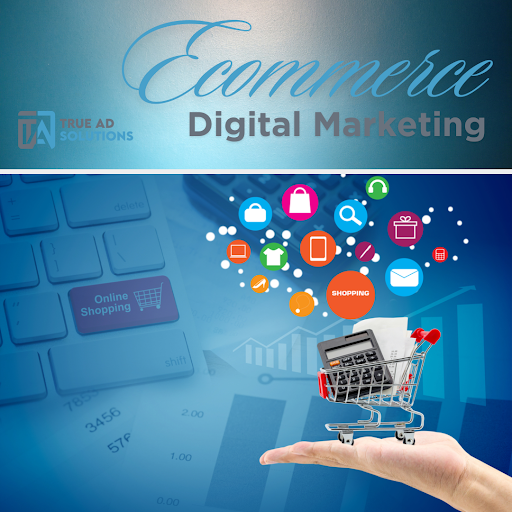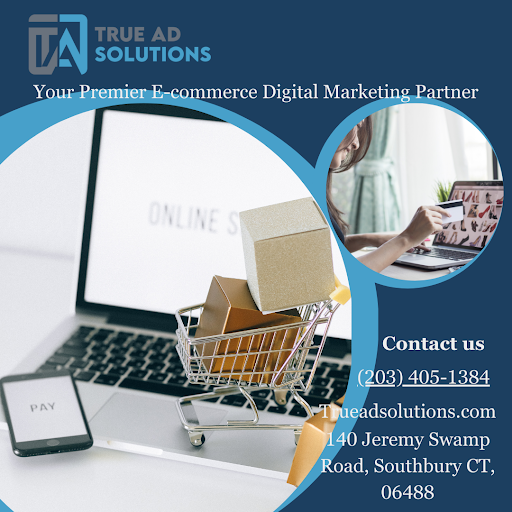
Recognizing the significance of an e-commerce digital marketing agency with a proven history is vital for businesses seeking success online.
These e-commerce marketing agencies specialize in crafting personalized strategies designed to meet the specific requirements and objectives of e-commerce enterprises.
A digital marketing agency for e-commerce offers various services, including web development, optimizing product listings, and website performance.
Targeted advertising campaigns enhance a business’s online presence and drive sales.
Additionally, they provide comprehensive data analysis to fine-tune strategies and maximize results.
Key Services Offered by E-commerce Digital Marketing Agencies
E-commerce marketing agencies offer a range of digital marketing services tailored to boost online presence and drive sales:
1. E-commerce Search Engine Optimization (SEO)
Optimize product pages and website content for higher search engine rankings.
Conducting keyword research to target relevant search queries.
Implement on-page and off-page SEO strategies to improve online visibility and organic traffic.
2. Pay-Per-Click (PPC) Advertising Strategies
Create and manage PPC campaigns on platforms like Google Ads and Bing Ads.
Target specific keywords and demographics to reach potential customers.
Optimize ad copy and landing pages for maximum click-through rates and conversions.
3. Social Media Marketing (SMM) Campaigns
Craft social media marketing plans to connect with your intended audience.
Plan and timetable content for Facebook, Instagram, and Twitter.
Implement paid social media promotions to enhance brand recognition and direct traffic to an e-commerce site.
4. Content Marketing for Ecommerce Brands
Generate valuable content like blog entries, articles, and videos to inform and captivate your audience.
Share valuable information related to products, industry trends, and customer experiences.
Utilize content marketing to establish brand credibility, draw in organic traffic, and promote return visits to e-commerce platforms.
5. Email Marketing Solutions
Building and segmenting email lists based on customer demographics and preferences.
Designing and sending targeted email campaigns to promote products, announce sales, and nurture customer relationships.
Analyze email performance metrics such as open and click-through rates to optimize future campaigns.
How to Choose the Right E-commerce Digital Marketing Agency
Selecting the top e-commerce marketing agency can significantly impact the success of your online business.
Here are some key factors to consider when making your decision:
1. Assessing Experience and Expertise
Industry Experience:
Look for top e-commerce marketing agencies with a proven track record of success in your industry or niche.
Specialized Expertise:
Choose an e-commerce marketing company that specializes in e-commerce marketing and understands the unique challenges and opportunities of online retail.
Team Credentials:
Evaluate the expertise and qualifications of the agency’s team members, including their experience with relevant tools and platforms.
2. Reviewing Case Studies and Client Testimonials
Portfolio of Work:
Review the agency’s portfolio to see examples of past projects and campaigns.
Client Testimonials:
Read testimonials and reviews from previous clients to gauge satisfaction levels and overall performance.
Case Studies:
Search for case studies that show how a digital marketing agency specializing in e-commerce can deliver concrete outcomes for clients, like boosting website traffic, improving conversion rates, or enhancing ROI.
3. Evaluating Pricing and ROI Expectations
Transparent Pricing:
Seek clarity on the agency’s pricing structure, including additional fees or charges.
Value for Money:
Consider the agency’s pricing with the services offered and the expected return on investment (ROI).
ROI Expectations:
Discuss your goals and expectations with the agency to ensure alignment and establish realistic ROI targets.
Trends in E-commerce Digital Marketing Agency Strategies
The best E-commerce marketing companies are constantly evolving to stay ahead of the curve and capitalize on emerging trends in the industry.
Here are some key trends shaping their strategies:
1. Voice Search Optimization for E-commerce Platforms
Rising Popularity:
As smart speakers and virtual assistants become more common, voice search is becoming a significant part of online search habits.
Optimizing Content:
E-commerce digital marketing agencies are focusing on optimizing product listings and website content for voice search queries, including conversational keywords and natural language phrases.
Enhanced User Experience:
By embracing voice search optimization, agencies can improve the user experience for customers and drive more targeted traffic to e-commerce platforms.
2. Personalization Techniques in Ecommerce Marketing
Tailored Recommendations:
E-commerce digital marketing agencies are leveraging advanced personalization techniques.
By utilizing these methods, personalized product suggestions and content can be provided to users, taking into account their browsing habits, purchasing patterns, and preferences.
Dynamic Content:
Dynamic content marketing strategies, personalized email campaigns, and product recommendations help businesses engage with customers and drive higher conversion rates.
Increased Customer Loyalty:
By providing personalized shopping experiences, agencies can foster stronger impacts on customers, increase brand loyalty, and encourage repeat purchases.
3. Mobile-friendly marketing Initiatives
Mobile Optimization:
With the trend of online shopping now taking place on mobile devices, e-commerce digital marketing agencies recognize the importance of prioritizing mobile optimization strategies.
They aim to ensure seamless browsing and purchasing experiences across all devices.
Responsive Design:
Agencies are implementing responsive web design techniques to create mobile-friendly e-commerce websites that adapt to various screen sizes and resolutions.
Mobile Advertising:
E-commerce digital marketing agencies utilize mobile advertising platforms like Google Ads and Facebook Ads. They focus on mobile users by optimizing ad formats and strategies to boost conversions and maximize ROI.
4. Utilizing Data Analytics for Targeted Marketing Efforts
Data-Driven Insights:
E-commerce digital marketing agencies are harnessing the power of data analytics tools.
These tools gather valuable insights into customer behavior, preferences, and purchase patterns.
Segmentation and Targeting:
By segmenting their audience based on demographic, geographic, and behavioral data, agencies can deliver more targeted and personalized marketing campaigns that resonate with specific customer segments.
Predictive Analytics:
Advanced analytics techniques, predictive modeling, and machine learning algorithms enable agencies to anticipate customer needs and preferences, optimize marketing strategies, and drive higher engagement and conversions.
Challenges Faced by E-commerce Digital Marketing Agencies
E-commerce digital marketing agencies strive to deliver exceptional services and results for their clients.
They often encounter various challenges in the ever-evolving landscape of online marketing.
Here are some common obstacles they face:
1. Adapting to Algorithm Changes in Search Engines
Challenge:
Search engines, such as those of Google and Bing, are challenging for e-commerce digital marketing agencies to keep up with the latest updates and changes.
Algorithm updates can impact website rankings and visibility, requiring agencies to adapt their SEO strategies accordingly.
Solution:
To overcome this challenge, agencies must stay informed about algorithm updates and changes in search engine ranking factors.
They should continuously monitor website performance and analytics data, conduct regular SEO audits, and adjust their strategies to align with the latest algorithm requirements.
2. Balancing Organic and Paid Marketing Efforts
Challenge:
E-commerce digital marketing agencies often balance organic and paid marketing efforts to maximize results within budget constraints.
While organic strategies such as SEO and content marketing yield long-term benefits, paid advertising offers immediate visibility and targeted reach.
Solution:
A digital marketing agency for e-commerce must balance organic and paid media marketing efforts based on their client’s goals, budgets, and timelines.
Integrated marketing strategies that harness the strengths of both organic and paid approaches are essential.
Combining organic efforts with targeted paid media campaigns drives immediate results and conversions.
3. Navigating Regulatory Compliance in E-commerce Advertising
Challenge:
E-commerce advertising is subject to various regulations and compliance requirements.
It includes data privacy laws, advertising standards, and consumer protection regulations.
Ensuring compliance with these regulations while executing effective marketing campaigns can be complex and challenging for e-commerce digital marketing agencies.
The goal is strategically promoting the e-commerce store, attracting and retaining more online shoppers, and driving more sales.
Solution:
To address this challenge, agencies must stay informed about relevant laws and regulations governing e-commerce advertising in their target markets.
They should work closely with legal experts to ensure compliance with data privacy regulations, advertising standards, and consumer protection laws.
A digital marketing manager should implement robust data security measures and transparency practices to protect customer information and build trust.
The Future of E-commerce Digital Marketing Agencies
As technology evolves and consumer behavior shifts, the future of a digital marketing agency for e-commerce is poised for exciting innovations.
Here are some trends shaping their future:
1. AI Integration for Predictive Marketing Insights
Trend:
Agencies are integrating AI into their strategies for predictive marketing insights.
AI-powered analytics tools analyze data to predict customer behavior and optimize campaigns.
Impact:
AI enables more personalized campaigns, improves engagement, and drives higher conversion rates.
A digital marketing agency for e-commerce can anticipate customer needs, optimize ad targeting, and increase ROI.
2. Augmented Reality Experiences in E-commerce Advertising
Trend:
Augmented reality (AR) transforms how consumers interact with brands online.
Agencies use AR to create immersive shopping experiences, allowing customers to visualize products before purchasing.
Impact:
AR enhances engagement, reduces returns, and boosts sales.
Customers can virtually try on clothing, visualize furniture, or preview cosmetics, improving the shopping experience.
3. Sustainability and Ethical Branding in Marketing Campaigns
Trend:
Agencies emphasize sustainability and ethical branding in campaigns.
Brands align with eco-friendly practices and social responsibility to attract organic traffic.
Impact:
Sustainable branding builds loyalty and differentiation.
E-commerce brands appeal to socially conscious consumers, driving affinity and long-term loyalty.

Unleashing Success: True Ad Solutions, Your Premier E-commerce Digital Marketing Partner
Choosing the right e-commerce digital marketing agency is crucial for achieving success. True Ad Solutions stands out as the best e-commerce digital marketing agency focused on unparalleled expertise, innovation, and results-driven strategies.
With a marketing team of seasoned professionals and a proven track record of delivering exceptional results for clients, True Ad Solutions is your trusted partner in navigating the complexities of online marketing.
From cutting-edge AI integration to immersive augmented reality experiences and sustainable branding initiatives, True Ad Solutions is committed to helping businesses thrive in the digital landscape. With True Ad Solutions by your side, the possibilities for e-commerce success are endless.
Interesting Related Article: “Maximizing Your Marketing Budgets: Strategies for Efficient Digital Billboard Advertising“

